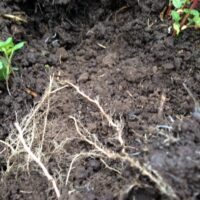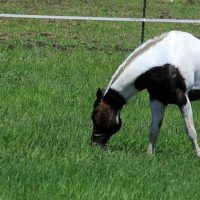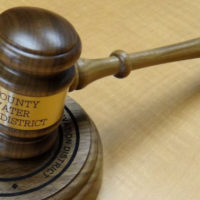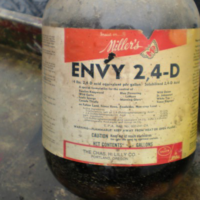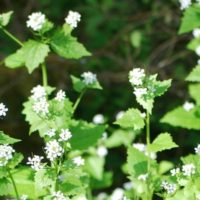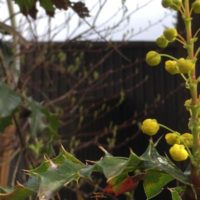1 - Water quality and quantity
There are a wide variety of techniques landowners can use to reduce their water usage. Drip irrigation, mulching, dry farming, soil moisture monitoring, and determining the best time and frequency for watering can be used separately or in unison to reduce water usage. Efficient irrigation can result in huge water and money savings, as well as reduced weed pressure and erosion as described in this article on our website.
In addition to many cultural, mechanical, biological, and chemical practices for managing pests and weeds on a farm property, the District also offers two programs to help agricultural producers in Clackamas County. The Windsock Program gives producers real time information to make better spray decisions.
The Sprayer Efficiency Program helps agricultural producers replace parts such as spray tips and pressure gauges and regulators to make their sprayer more efficient to achieve better control and reduce costs. To learn more about these programs, contact Lisa Kilders at 503-210-6002 or at [email protected].
You may also wish to investigate integrated pest management, or IPM. What is it? The Oregon Department of Agriculture has a summary page about IPM. If you are a nursery grower, you will want to get to know Oregon State University’s Nursery IPM program.
2 - Habitat for fish / wildlife / pollinators
Whether you live in an urban or rural area, pollinators can use your help:
– Plant a variety of native plants that bloom at different times of the year around your property and be sure to provide sources of water.
– Leave areas undisturbed for nesting sites or install pollinator nesting boxes.
– Limit pesticide use wherever possible, especially during times when plants are blooming.
Streambank erosion is a problem for landowners living along the many waterways here in Clackamas County, but it is also detrimental to our native fish species. Stabilizing streambanks not only helps landowners, it improves fish habit and water quality. Our conservation specialists can provide guidance on how to create a strong and healthy riparian zone along your waterways, provide information on exclusion fencing to limit access by livestock, and remove stream impediments that cause scouring and erosion. Read here for more information.
The District works with landowners in collaboration with other agencies to develop habitat conditions to enhance the life cycle of wild creatures, including fish.
Many of our urban landowners are now able to take advantage of the Backyard Habitat Certification Program.
Rural landowners can receive help with establishing or developing oak habitat, native plant habitat, and riparian/streambank planting. Education opportunities are also occasionally offered on the use of beneficial insects and pollinators as well as how to reduce pesticide and herbicide usage which can limit or harm wildlife.
3 - Invasive weed management
Weeds are a concern for almost everyone who owns property. Clackamas SWCD, through its WeedWise program, offers general and specific information for dealing with common and less-common weeds.
In general, healthy, well cared for soil and pastures are much more resistant to infestations of weeds, so proper pasture, mud, and manure management is your first defense against weeds.
In the event that you discover a priority invasive weed on your property, please contact the Oregon Invasive Species Hotline. For a list of noxious weeds in Clackamas County, please visit: https://weedwise.conservationdistrict.org/weeds.
There is no county-level regulatory agency available to enforce rules and regulations regarding invasive weeds. Many cities do have nuisance ordinances that require invasive plants be removed along fence lines, or kept below a certain height. Contact your local municipal code enforcement for more specific information.
Outside of municipalities, it is recommended that neighbors work together to control invasive weeds across property boundaries. Good neighborly relationships and education about how best to manage weeds can help. If neighborly relations sour, landowner are encouraged to contact Clackamas County Community Mediation Services for assistance.
We recommend that you use best management practices for controlling tansy ragwort as published on the Clackamas SWCD’s WeedWise website.
Best management practices are also available for many other noxious weeds such as English ivy, Scotch broom, and Himalayan blackberry.
4 - Mud and manure management
The District has a wide variety of technical resources to guide landowners through a process to manage mud and manure. We usually recommend some combination of the following practices:
– Use fences to keep animals out of creeks, wetlands, and lakes.
– Practice good pasture management for a healthy pasture.
– Designate a sacrifice area where you are willing to keep your livestock during the winter and for short periods during the growing season.
– Install a heavy use area that will keep your animals out of the mud.
– Maintain a grassy area around all sacrifice areas to filter any runoff that may occur.
– Install gutters and downspouts on all buildings and divert water away from the sacrifice area or barnyard.
– Plant trees and moisture-loving shrubs outside of sacrifice areas.
A conservation specialist can help you determine which techniques are right for you. Click here to learn more.
Animal manure can be both a blessing and a curse.
Manure can be composted, and compost can increase the tilth of your soil and health of your pastures. However, manure that is left to collect in large piles can contaminate wells, streams, and river, creating health and safety concerns for people, livestock, wildlife, and drinking water sources.
Need more information? Check out this article.
5 - Other conservation actions on your land
Whether you own an urban lot or an agricultural property, the District offers many tools and techniques for improving soil quality and reducing erosion. Examples include no-till cultivation, integrated soil fertility management, cover-cropping, natural predation of pests and reduction of pesticides, mulching, and crop rotation. The first step for most land owners is to perform a soil test. Here’s list of places where you can get good information for your specific soils, garden, or field.
Visit Firewise USA to learn the basics of creating defensible space, landscaping techniques, and how homes ignite (and what you can do about it). King County DNR has a short list of eight things you can do.
A conservation plan is a tool, unique to your property, designed to help you be successful in your land or agricultural endeavors. A District conservation specialist will meet with you to evaluate the soil, water, air, plant, and animal resources on your property and offer several alternatives to address the resource conditions. This will enable you to make decisions on how best to manage your property to achieve your goals while still protecting, preserving, and/or developing our shared natural resources today and for future generations. You can get started on your own by going here.
6 - About the Clackamas Soil and Water Conservation District
Yes! Clackamas SWCD makes a variety of agricultural equipment available at reasonable prices through an equipment rental program.
On rare occasion, when funding is available and a project meets criteria set by the District, loans, grants, or cost-share programs MAY be available to cooperators who have a conservation plan with the District.
Clackamas Soil and Water Conservation District can help you with a wide array of issues, or can refer you to others who may be able to help. Examples include: agriculture, animals, grazing, horses, goats, pigs, cattle, poultry, organic, no-till, workshops, easements, conservation, education, succession, transition, water, rotational grazing, fencing, irrigation, water catchment, hazelnuts, hay, berries, salmon, native fish, wildlife, demonstration, pesticide, herbicide, river, creek, water quality, water quantity, raingarden, scholarship, sustainable, small farms, farm to school, soil testing, land access, beginning farmers and more.
The Clackamas Soil and Water Conservation District is NOT a regulatory agency. We work cooperatively with land owners to help them realize their goals for their property while providing resources to assist them in being the best land stewards they can be.
The District is neither part of nor related to the governing body of Clackamas County. Rather, the District is a special district, much like a school district or fire district, with an elected board of directors. Five of these directors are elected from specific zones throughout Clackamas County and two directors are elected “at large” from anywhere in the District. Directors serve four-year terms. Our district’s borders are those of Clackamas County.

